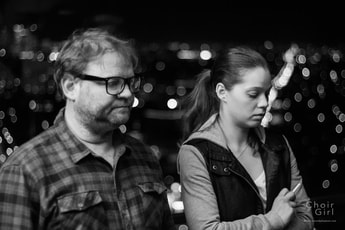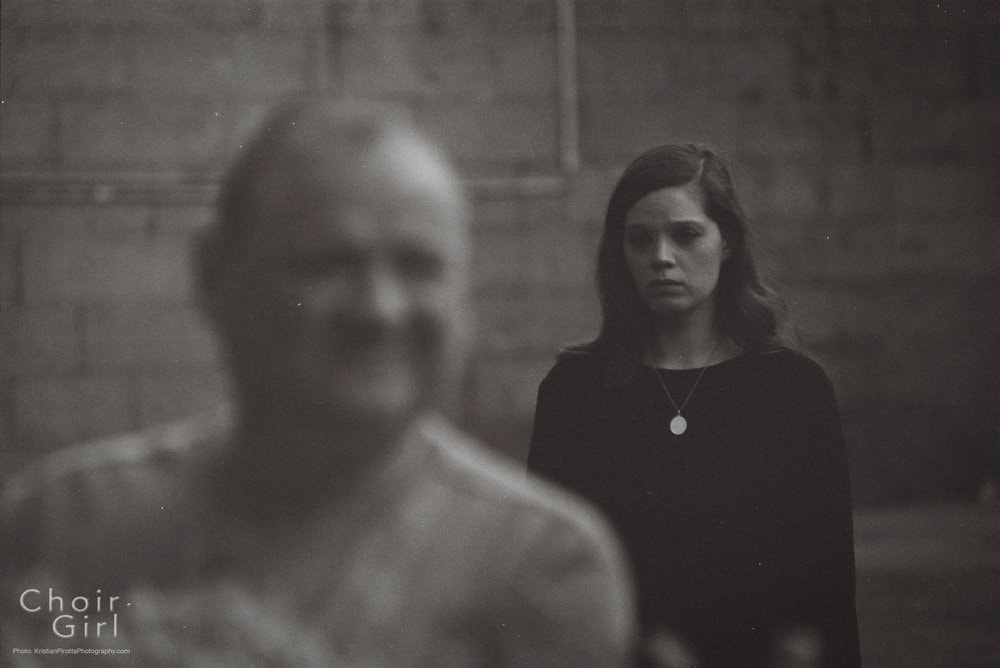|
Originally published on Elements of Madness ★★☆☆☆  Peter Flaherty as Eugene in CHOIR GIRL. Photography by http://www.FacesByRaphael.com | Melbourne Actors Headshots. Peter Flaherty as Eugene in CHOIR GIRL. Photography by http://www.FacesByRaphael.com | Melbourne Actors Headshots. Choir Girl sets up a story that begs to be told through pictures. Its protagonist, Eugene (Peter Flaherty), is a shy street photographer who hopes that his pictures will expose the hardships of everyday life in his neighborhood and, eventually, make him enough money to pack up and move somewhere better. But it’s not simply the main character’s profession as a photographer that makes this story so well suited for film. Choir Girl, the feature debut of writer/director John Fraser, is all about looking and being looked at, about capturing and criticizing images, and about creating perspective through the lens of a camera. Any narrative that is so centrally structured on these subjects is a narrative most artfully told through film or photography itself rather than words, music, or live performance. Films about film naturally develop multiple layers of self-reflexivity and can, in turn, create a self-aware viewing experience for the audience. Choir Girl sets the stage for such a viewing experience but, unfortunately, watches more like a rough first draft than a final cut. Although it is bubbling with potential, Choir Girl leaves much to be desired. After a promising conversation with a staff member from the elite Slipstream magazine, Eugene brings his photos all the way to the publication’s high-rise office, only to be vehemently rejected by the strait-laced editor, Anne (Jillian Murray). Anne explains to Eugene that his pictures of the drugs, prostitution, and crime in his neighborhood are nothing more than “voyeurism.” Soon thereafter, Eugene is walking home at night and happens to snap a photograph of a teenager named Josephine (Sarah Timm), who has been trafficked into a tight and inescapable prostitution ring that influences both the local police and hospitals. Eugene’s chance photograph captures the attention of Slipstream’s career-climbing assistant artistic director, Polly (Krista Vendy), who immediately wants more photographs of the captivating young girl who looks like “someone you’d want to save.” Eugene hopes that, with Polly’s help, he can expose the conditions of Josephine’s life to the public and somehow rescue her. Josephine, for her part, certainly wants to be rescued from her horrendous current life, but doesn’t seem to get much of a voice in the whole process. With murky intentions from all parties, a web of misguided plans and distrust begins to form with the frightened Josephine at its center, all because she looked into Eugene’s lens at the right moment.  L-R: Sarah Timm as Josephine and Peter Flaherty as Eugene in CHOIR GIRL. Photography by http://www.FacesByRaphael.com | Melbourne Actors Headshots. L-R: Sarah Timm as Josephine and Peter Flaherty as Eugene in CHOIR GIRL. Photography by http://www.FacesByRaphael.com | Melbourne Actors Headshots. With a socially artless photographer for a protagonist and a “muse” who craves compassion and freedom but does not want her traumatizing situation forever memorialized on film, Choir Girl is rich with complex themes about voyeurism, spectatorship, and the gaze. It is clearly a well-intentioned film that speaks to poverty tourism, unethical career climbing, and exploitation in both art and activism. However, while Choir Girl may get its audience thinking about these themes, it serves as a conversation-starter only. With an underdeveloped plot and unstable characters, Choir Girl offers little original commentary of its own. Its characters are initially interesting, but they never fully develop and their motives are unclear throughout. This is, in part, due to the nature of the film as a suspenseful thriller. We aren’t supposed to know who is truly good or bad until the end when all the secrets are revealed. However, the characters awkwardly shift from sympathetic to villainous and back again in a stiff and confusing way. Again, while there seems to be good intent behind these characters and what they represent, much of Choir Girl watches like an oversimplified PSA. To its credit, there are a handful of elements in Choir Girl that, on their own, are quite fantastic, but don’t fit together to create a whole. The film is shot in black-and-white, matching the story’s grim tone and adding a glossy finish that creates a concrete sense of narrative distance, making the oversimplified plot and characters a little easier to swallow. Choir Girl seeks to imitate the lighting and style of a classic noir thriller, but in the end, doesn’t fully live up to the charm and sophistication that made such classics so memorable. The score is also beautiful on its own but it doesn’t sync up with the emotional cues of the film and throws the tone off balance. Likewise, the subject matter itself is quite intriguing, but it plays out in a forced, uncomfortable, and underdeveloped manner.  L-R: Peter Flaherty as Eugene and Sarah Timm as Josephine in CHOIR GIRL. Photography by http://www.FacesByRaphael.com | Melbourne Actors Headshots. L-R: Peter Flaherty as Eugene and Sarah Timm as Josephine in CHOIR GIRL. Photography by http://www.FacesByRaphael.com | Melbourne Actors Headshots. The unintentional result of this underdeveloped plot is a twisted savior fantasy in which Eugene’s voyeurism and his desire for Josephine (who is, again, a teenager) are glorified as the means through which he can rescue her. Choir Girl attempts to create a hero who overcomes his flaws and discovers new strengths as he rescues a friend in distress, but instead, it accidentally redeems pedophilia and sexual entitlement, presenting a fantasy in which these qualities are an honorable burden that Eugene must bear in order to become the hero and save Josephine. There are, of course, plenty of other narrative situations in which characters must perform an unethical task in order to ultimately do the right thing. However, in at least two key scenes, Choir Girl so unabashedly revels in Eugene’s otherwise unethical acts that it is very difficult not to see these scenes as a roundabout excuse for showing sexual trauma on screen. This is especially disappointing because, as a film that is so completely about film, looking, and perspective, Choir Girl had the opportunity to tell a much different story. Although the interesting narrative set-up may provoke insightful discussions among its viewers, Choir Girl ultimately needed more refining. Available now on VOD and digital
0 Comments
Leave a Reply. |
"Our embodied spectator, possibly perverse in her fantasies and diverse in her experience, possesses agency...finally, she must now be held accountable for it." Categories
All
|
